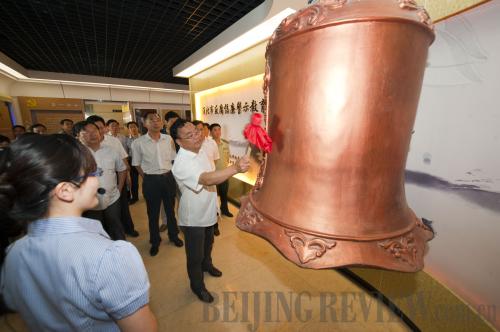|
 |
|
ALARM BELL: The first anti-corruption education center in east China's Anhui Province uses case studies to raise the public awareness against corruption (XINHUA) |
In recent years, a two-digit number of provincial- and ministerial-level officials in China have been investigated and punished on corruption charges, triggering allegations the Communist Party of China (CPC) is increasingly corrupt.
This is an incorrect assumption based on a negative perspective. The fact is the Party has consistently enhanced its resolve and efforts to combat corruption, and has achieved remarkable results.
Since 2008, the CPC Central Committee has implemented the Work Plan for Establishing and Improving Corruption Punishment and Prevention System for 2008-12 and accordingly enforced a responsibility system for improving the Party's style of work and upholding integrity. It has investigated a number of corruption cases of great social influence, put right malpractice that damages public interests and improved the regulations concerning leading officials' integrity and self-discipline. Efforts have also been made to formulate laws and rules on combating corruption and upholding integrity. The intensified anti-corruption battle provides a strong guarantee for the Party's construction and the country's development.
Because of the Party's resolute stance and effective measures against corruption, the number of corruption cases is on the decline. In the meantime, the CPC has accumulated great experience to cope with the social tumor.
Since the beginning of the 21st century, especially the Third Plenary Session of the 16th CPC Central Committee in 2004, the Party has applied the Scientific Outlook on Development to the fight against corruption, worked hard to improve its style of work and build a clean government. All these efforts focus on safeguarding the fundamental interests of the people. The CPC adheres to the principle of addressing both symptoms and root causes of corruption, and taking comprehensive measures to rectify both, combining punishment with prevention while focusing on the latter. It pays great attention to establishing an effective system to punish and prevent corruption that places equal importance on education, institutional improvement and supervision, developing socialist political democracy, and forming democratic supervision mechanisms to curb abuses of power.
Nevertheless, the situation in combating corruption is still arduous in China for various reasons. Some officials do not have firm Communist loyalty or a strong awareness of the Party's aims. Some cut themselves off from the masses and pursue luxurious lifestyles. A few officials abuse their power and positions for illegitimate personal gain. Corruption cases involving senior officials have extremely negative social impact. Major corruption cases repeatedly occur in vulnerable sectors, including a growing number of collective, serial and interlinked offenses. In addition, malpractice that damages public interests and that is often complained about by the public has not been addressed effectively. Some anti-corruption laws and regulations have not been enforced thoroughly. There are still loopholes in the Party's discipline inspection and supervision systems.
The Party's Central Committee is fully aware of the challenges, but is confident of eliminating corruption. In fact, its firm political vision, political commitment and political resolve have created a favorable environment for pushing the anti-corruption battle forward. More importantly, the Party's maturing anti-corruption theories and strategies and the country's progressing democratic and legal systems have given momentum to the formation of the supporting legal framework. In the meantime, public support to and participation in anti-corruption efforts are greater than any time in history. Against this background, the number of corruption cases is certain to fall.
Simply put, the CPC adopts a comprehensive anti-corruption strategy integrating reform and opening up with institutional improvements. Detailed measures are:
- Adhering to the principle of addressing both symptoms and root causes of corruption, and taking comprehensive measures to rectify both, combining punishment with prevention while focusing on the latter; pushing forward the construction of the system for corruption punishment and prevention; attaching special importance to the rectification of root causes of corruption, prevention efforts and institutional improvement, and expanding work areas to prevent corruption at the source.
- Strictly implementing the responsibility system for improving the Party's style of work and upholding integrity; building a long-term education mechanism for corruption prevention, and improving the unified leadership of dispatched units of the CPC's discipline watchdogs to various departments and upgrading the inspection system.
- Intensifying efforts to ensure leading officials are incorruptible and self-disciplined, and fortifying their moral defense against corruption; resolutely rectifying malpractice in various trades and departments and carefully tackling complaints of major public concern, and severely punishing all breaches of law and discipline.
The author is a researcher with the Marxism Institute, Chinese Academy of Social Sciences | 